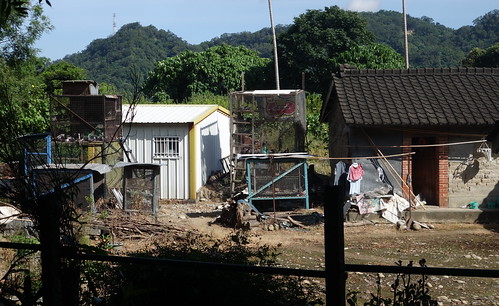This week the focus was on the asset bill directed at the KMT. The bill has solid support: yet another poll came out showing public support for the recent passage of the KMT assets bill: 53.9% say that it is an important step in transitional justice. Solidarity translated the recent TISR poll on it, noting that 61% support the bill and only 11% believe the KMT's story on its assets. The public is on board with the idea of KMT assets being transferred to the state as a form of transitional justice...
The legislature approved the law on Monday. The Taipei Times reported:
The legislature yesterday passed legislation governing ill-gotten political party assets, which states that all properties obtained by political parties after 1945 — not including party membership fees and political donations — are to be considered illegal and must be returned to the state.Several pieces of interesting information here. First, the KMT has a year to do the accounting. Lots of stuff will disappear -- I hear interesting stories from my friends in the financial community about seedy attempts to sluff off these assets. Second, the law does have language allowing for seizure of assets if they have been offloaded. Third, only 31 legislators voted against the legislation from the KMT, which has 35. This means that four legislators defied their party. The KMT wants to send the bill for constitutional review -- the courts are packed with KMTers from the previous Ma Administration -- but it needs 38 votes -- 1/3 of the legislature. It is now attempting to find votes from other parties.
...
The act states that all assets of a political party are considered frozen the moment the act is promulgated, with violators facing a jail term of up to five years. Any attempt to avoid, deny or obstruct investigations into party assets could lead to a fine of between NT$100,000 and NT$500,000.
The legislature also voted to approve a key provision of the act that stipulates that assets obtained since Aug. 15, 1945, would be subject to the proposed law.
....
The DPP moved to amend the official name of the draft from the “act on handling ill-gotten party assets” (不當黨產處理條例草案) to the approved version to include assets held by the KMT’s affiliate organizations, such as the China Youth Corps and the National Women’s League of the Republic of China, as the funding of these organizations has always been included in the party’s fiscal budget.
Ralph Jennings, the Taipei-based journalist, who manages to be both cynical and centrist at the same time, had a really great comment on the assets bill in our ICRT radio broadcast of the other day. He pointed out that the KMT will likely tie up all these asset seizures in court for years to come. That to me suggests the ultimate solution may well be a massive settlement. But that's years off...
This tale is only beginning...
_____________
Daily Links:
- HEY: the DPP Administration is doing away with the ROC Yearbook. Wrong move. If you know someone inside MOFA or the EY, please tell them that the Yearbook is an important source of information and the Tsai Administration can shape what is presented to its political ends. Tell them to change the name to Taiwan Yearbook, too!
- Bad press for Taiwan in Canada
- Scientology on the rise in Taiwan?
- The beautiful and informative blog Synapticism visits Fushui village
- Lovely pics from Josh Ellis of Shifen Waterfall
- Sexual subjects on the move across the Taiwan Strait
- Vietnam says 200,000 affected by Taiwan steel firm pollution
- Tsai approval down
- GDP limps up slightly for first time in three quarters
- Taiwan and Japan in spy satellite sharing
- Latest on the bus driver murder-suicide of 26: he was convicted of sexual assault and owed big bucks to the victim. This is another failure of that stupid system whereby people convicted of crimes are out on the street with the change for revenge or escape for weeks before being jailed. Can we get that reformed?
[Taiwan] Don't miss the comments below! And check out my blog and its sidebars for events, links to previous posts and picture posts, and scores of links to other Taiwan blogs and forums!

Michael, you wrote:
ReplyDelete- - -
Tell them to change the name to Taiwan Yearbook, too!
- - -
Better title: ❝Taiwan Yearbook: There's Nothing Here About Mongolia or China❞
Tim Maddog
I listened to the ICRT podcasts, SCS and this one. It is enjoyable. I wish more Taiwanese English learners would discover this public treasure of pod program.
ReplyDeleteThe evil way in which KMT had massed thier wealth was not talked about much, but that would take a month long.
Michael, I'm not sure if you saw this July 22 Diplomatic article (http://thediplomat.com/2016/07/how-bad-is-taiwans-economy/) or if you mentioned it previously. I couldn't find it in your previous posts at the time, but I know you're usually all over this kind of report and the tone of this particular article fits very well with your own comments about Taiwan economic growth during the Chen Shui Bian years vs. the Ma Ying Jeou years.
ReplyDeleteFor example the article notes: "Before the Taiwanese presidential election this year, there was a debate comparing economic growth under President Chen Shui-bian of the DPP government from 2000 to 2007 and under President Ma Ying-jeou of the KMT government from 2008 to 2015. Our calculations show that the average annual PPP GDPpc growth rate from 2000 to 2007 was 6.9 percent while that from 2008 to 2015 was a lackluster 4.4 percent. It appears that Ma’s “cross-Strait peace dividends” did not benefit the general public but a few big businesses."
The author, Dr. Frank Hsiao, comes across as a little emotionally pro-DPP but even allowing for some bias in his interpretation, his data looks clear and supportive.
If you've already been through it then sorry for rehashing. Best.